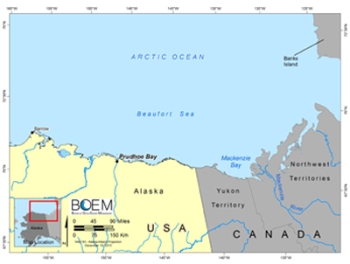Nov 28 2014
The University of Toronto Mississauga (UTM), as a part of the Stantec Team, has been selected by an interagency scientific review panel to lead a long-term scientific study of the Arctic marine ecosystem along the Beaufort Sea shelf from Barrow, Alaska to the Mackenzie River delta in Canadian waters.
The Marine Arctic Ecosystem Study (MARES) stems from increased attention to climate change, energy development, and sustainability in the Arctic region. Information gained will aid government, industry, and communities in making decisions related to regulations, resource management, economic development and environmental protection issues.
 BOEM
BOEM
Professor Kent Moore, a U of T Mississauga atmospheric physicist, investigates how the ocean and the atmosphere communicate through the exchange of heat, energy and momentum.
“The Arctic is a very important part of the world and one that is seeing the most rapid changes to its climate,” said Moore, who has worked in the Arctic for more than 20 years. “It is logistically complicated to do research there, but thanks to MARES, we have an extraordinary opportunity to do interdisciplinary research there that will shed light on changes to the regional climate and the impact on the ecosystem."
Public/Private Partnership
MARES is an integrated ecosystem research initiative coordinated and planned by Bureau of Ocean Energy Management (BOEM), a bureau of the Department of the Interior, in conjunction with its federal and private sector research partners: U.S. Arctic Research Commission, U.S. Coast Guard, U.S. Geological Survey, U.S. Integrated Ocean Observing System, Marine Mammal Commission, National Science Foundation, National Oceanic and Atmospheric Administration, Office of Naval Research, and Shell Oil Company.
“BOEM is pleased to join our Federal and industry partners to undertake this forward-looking project,” said BOEM Acting Director Walter Cruickshank. “With widespread interest in the Artic, including potential oil and gas leasing and development, we’re looking to significantly expand our knowledge of the Beaufort Sea ecosystem to inform our decision-making.”
Study Goals
The overarching goal of the study is to better understand the interrelationships of the physical, biological, chemical and human systems, including traditional knowledge, of the Beaufort Sea and to advance scientific prediction capabilities for linkages between marine life, human uses, sea ice, atmospheric and oceanic processes and river discharge.
The research is being undertaken under the National Oceanographic Partnership Program (NOPP), which leverages resources from federal agencies, academia, industry and non-governmental organizations to support ocean research. It is important for BOEM and its NOPP partners to study and monitor areas know for high biological productivity and prevalent subsistence use to ensure their protection.
Over the course of the study, the team will use multiple sampling platforms, including ships, drones, satellites, and snow machines; multiple sampling techniques such as ice and snow sensors, acoustics and nets and multiple ocean, ice and air modeling approaches.
The study results will inform several research areas including environmental protection, climate change, food security, biodiversity, exploration and discovery and ecosystem services (the contributions that a biological community and its habitat provide to our day to day lives). An independent review board of internationally recognized experts will help steer and peer review the five-year project.
About the University of Toronto Mississauga
Established in 1967, the University of Toronto Mississauga is the second-largest division of U of T (Canada’s largest university), numbering 13,300 undergraduate students, 600 graduate students, over 2,000 full- and part-time employees (including 857 permanent faculty and staff) as well as over 47,000 alumni. The campus is situated on 225 acres of protected greenbelt along the Credit River, 33 kilometres west of the university’s St. George campus in Toronto. U of T Mississauga has 15 distinct academic departments, 145 programs and 88 areas of study, and includes the Institute for Management & Innovation and Centre for South Asian Civilizations. The Mississauga Academy of Medicine is located on campus in the Terrence Donnelly Health Sciences Complex.
About Stantec
We're active members of the communities we serve. That's why at Stantec, we always design with community in mind.
The Stantec community unites more than 14,000 employees working in over 230 locations. Our work—professional consulting in planning, engineering, architecture, interior design, landscape architecture, surveying, environmental sciences, project management, and project economics—begins at the intersection of community, creativity, and client relationships. With a long-term commitment to the people and places we serve, Stantec has the unique ability to connect to projects on a personal level and advance the quality of life in communities across the globe.
About BOEM
BOEM promotes energy independence, environmental protection and economic development through responsible, science-based management of offshore conventional and renewable energy and marine mineral resources. BOEM’s Environmental Services Study Program (ESP) develops, funds, and manages rigorous scientific research to inform policy decisions regarding the development of energy and mineral resources on the Outer Continental Shelf.